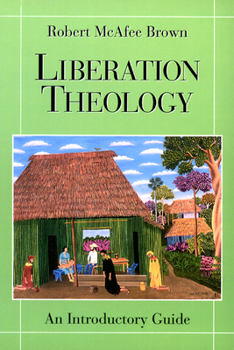Liberation Theology: An Introductory Guide
Select Format
Select Condition 
Book Overview
In a manner that is vivid and lively, Robert McAfee Brown explains and illuminates liberation theology for North American readers who may have no previous knowledge of this dynamic Christian movement.... This description may be from another edition of this product.
Format:Paperback
Language:English
ISBN:0664254241
ISBN13:9780664254247
Release Date:January 1993
Publisher:Westminster John Knox Press
Length:160 Pages
Weight:0.50 lbs.
Dimensions:0.4" x 6.0" x 8.7"
Related Subjects
Christian Books & Bibles Religion Religion & Spirituality Religious Studies TheologyCustomer Reviews
5 ratings
Well written and convinving book, but I disagree with liberation theology
Published by Thriftbooks.com User , 14 years ago
This book uses great examples as evidence of liberation theology. The author chooses his words carefully and makes strong connections. After I finished this book I felt like I really understood what the theology is, why it's necessary to practice, and how to talk about it. Many books don't leave me feeling as educated as this book does. However, having a degree in theology and studying it on my own, I do not agree that liberation theology should exist. This book allowed me to really think through my stance, but I feel that the concept of liberation theology assumes too much about God's will and doesn't acknowledge the difference between human will and God's will.
Great Book!
Published by Thriftbooks.com User , 17 years ago
This is an excellent introduction to Liberation Theology. It may make you uncomfortable, though...especially if you are from a "priveleged" background...I loved it because it spoke to the strange "dicotomy" within me of being a supposed "conservative Christian" with the Spirit of supposed "liberalism" in light of justice issues.
Easy Read
Published by Thriftbooks.com User , 19 years ago
This book is informative and easy to read. It goes by quickly and is an amazing introduction to Liberation Theology.
Brown Imparts Life Into the Study of Liberation Theology
Published by Thriftbooks.com User , 23 years ago
The author, Robert McAfee Brown, states that his goal for this book is to bear witness to the extraordinary faith of Latin American Catholics who participate in the Liberation movement (20). He has been, no doubt, successful in his objective. This text is intriguing more for its intent (a "call to action" for first-world readers) rather than for its main content (an introductory description of Liberation Theology-primarily in Latin America). The reader of this book will find many entreaties to action on behalf of the oppressed peoples of the world, many of whom reside in our "backyard"-the poor urban areas of North American cities (94). Brown does a commendable job of keeping the topic interesting through the consistent intermingling of real-life anecdotes with theological and historical descriptions. Perhaps the most impressive characteristic of this book is the fact that it reads more like a story than a theological text. In most non-fiction books, there are some areas that stand out more than others. This book is no exception. The introduction, for example, carries several stories of actual people who have suffered horrible atrocities in some areas of Central America. These real-life stories help the reader to understand the type of political, economic, and social oppression that a majority of Latin American people must deal with daily. Accordingly, it becomes more realistic for the reader to understand what a powerful "liberator" the Liberation movement has become for the lay Catholic in many parts of Latin America. The base church communities that have evolved to support the critical needs of the oppressed are much more than a reflection of a "professional" theological movement as we might, at first, guess. On the contrary, the roles are reversed. It is these base communities, providing for the needs of people, through which Liberation Theology-the subject-has evolved. So then, Liberation Theology as an academic field, is a mere reflection of how oppressed Christians respond-epistemologically and ecclesiologically-to the institutionalized oppression with which they must deal. Brown notes that "It is not enough to read books about poverty; commitment means encountering poor people" (56). Liberation Theology, therefore, can only be truly understood and practiced through and with the lives of oppressed peoples. Again, the real value of this book comes in Brown's consistent appeals to his readers for action in support of oppressed people groups. In fact, he even lists steps that we might take to truly "practice" Liberation Theology even while in the midst of our comfortable, first-world environment (116-120). If the reader is interested, the author's Endnotes and Section on Discussion Questions are both helpful and useful for further research.
Superb writing!
Published by Thriftbooks.com User , 24 years ago
Brown does an excellent job of portraying lib. theology for the "first world" reader. The book is fascinating. Reading it has had a deep impact on my life.




